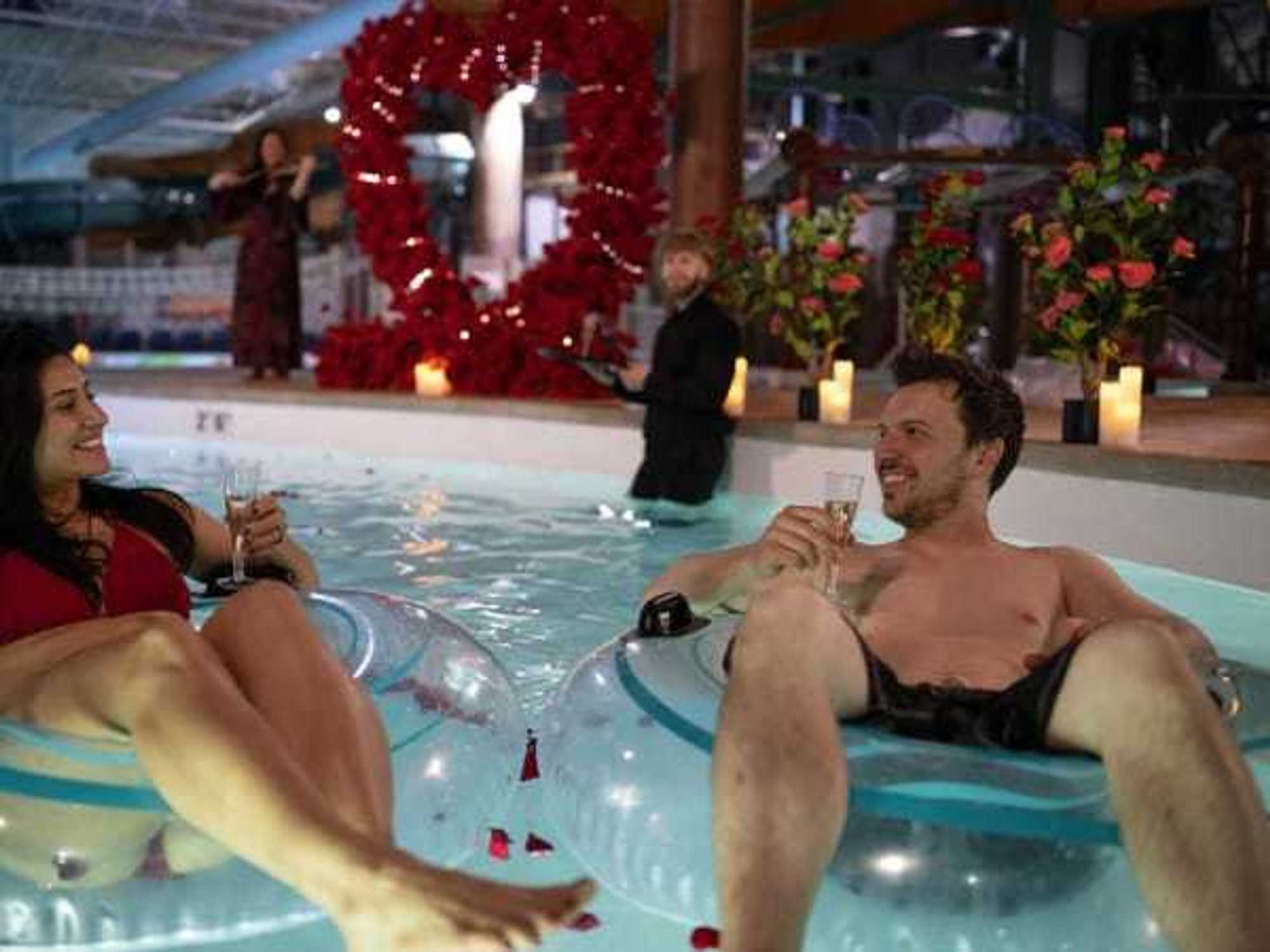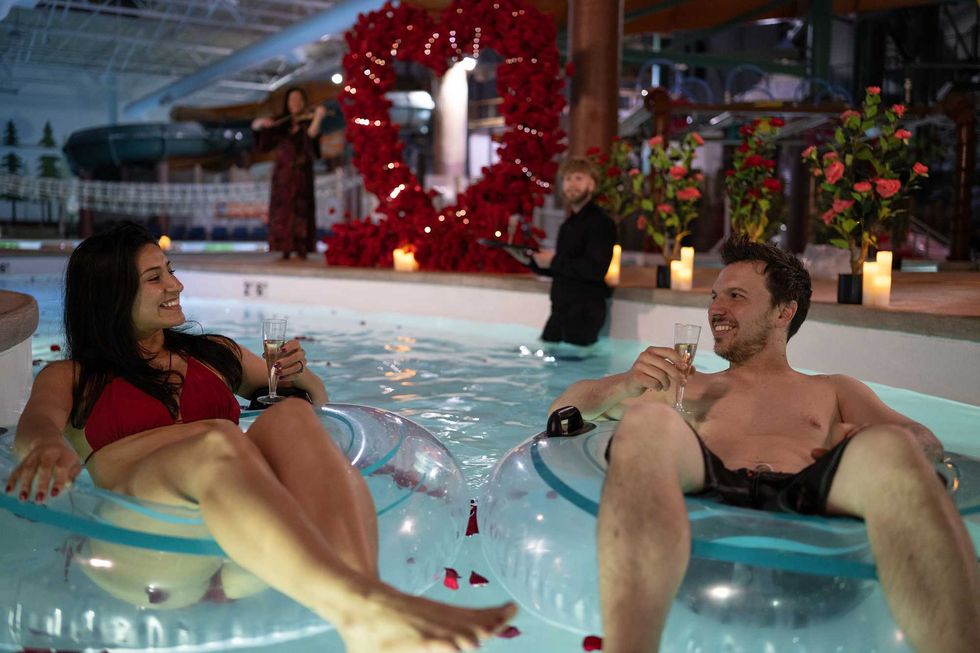From the weight of expectations to dashed engagement dreams, Valentine’s Day can lose its luster long after the flush of receiving folded, cartoon-covered Valentines from our Kindergarten classmates. If you’re considering calling it quits instead of braving one of Houston’s fine dining establishments this Valentine’s Day, don’t give up just yet. From floating in salt-saturated pools to belting out tunes under the stars, here are seven unique ways to celebrate love in Houston.
Altered States Wellness: Ultimate Date Night
For a more relaxing Valentine’s Day that focuses on health rather than chocolate, consider Altered States Wellness’ Ultimate Date Night. The date begins with a private float therapy session, where couples relax side-by-side in salt-saturated water, said to help reduce stress and anxiety. After, couples can enjoy charcuterie and champagne with other romantic notes in a private themed lounge. The Ultimate Date Night starts at $370, with add-ons available, including a Galentine’s package for four people at $600. Altered States Wellness is located in Vintage Park, and is open daily from 10 am-8 pm.
Botonica: L’amour Noir Pop-Up
An ode to Paris’ famed Moulin Rouge, L’amour Noir is a more intimate experience than Botonica’s other seasonal pop-ups such as the Cursed Cauldron, limited to only the 35-seat upstairs bar. Alas, Ewan McGregor will not be serenading Nicole Kidman in this version of Moulin Rouge, but attendees will be treated to a variety performance on Valentine’s Day featuring cabaret, drag, and boylesque. Tickets are $45 each and include a welcome cocktail. Doors open at 9 pm for the V-Day performance, with the show beginning at 9:30 pm. L’Amour Noir is February 6-21 at Botonica.
Great Wolf Lodge: Romance on the River
The kids may sulk, but only the parents can soak at the Great Wolf Lodge’s Romance on the River on February 14. This is the indoor water park resort’s first foray into an adults-only luxury dining experience, with the one-night only offer of a five-course lobster dinner and wine pairing in a private cabana. Dessert and champagne is enjoyed while floating in a double-tube around the resort’s lazy river filled with rose petals and floating candles and at a balmy 84 degrees. Romance on the River is $300 per couple, $400 with wine pairings.
Houston Museum of Natural Science: Atoms and Attractions
It’s easy to find a fellow nerd to fall in love with at the Houston Museum of Natural Science’s Atoms and Attractions party. Slip on a red, yellow, or green bracelet to indicate your relationship status before exploring all there is to offer, including a dance floor with DJs, karaoke in the planetarium, and “Pride and Prejudice" on a loop in the theatre. Nothing says “I love you” like strolling amidst dinosaur bones with a themed cocktail in hand. The Atoms and Attractions event is Friday, February 13, from 7-11 pm. Tickets are $30 for members and $35 for the public.
POST: Valentine’s Market for Makers
Get crafty with your crush at POST during the Valentine’s Market for Makers. The two-day event brings together more than 100 vendors to peruse, with free photo ops and food and drink for purchase. Patrons can stretch their imagination at the DIY station by creating a handmade keepsake. This is a Valentine's activity for the whole family, with free entry for kids under 12. After all that shopping, why not make a true commitment to everlasting love and stop by the BARC adoption event also held that Saturday at POST. The Valentine’s Market for Makers is February 14-15 from 11 am-5 pm, with tickets ranging from $6-$20.
Velocity Sim Lounge
Make your beloved passenger princess’ heart flutter with a stint at Velocity - Sim Racing Lounge. Velocity’s new two-person simulator lets one lover in the driver’s seat while the other rides shotgun, with the choice to switch spots. The Sawyer Yards racing spot has two deals for lovebirds: Speed Date ($99) consists of a 30-minute simulator race, two drink tickets, and two entrees, while the Double Date ($135) extends the exhilaration to a full hour in the driver’s seat. The specials run February 13-16, and Velocity - Sim Racing Lounge is open Friday from 12 pm - 12 am, Saturday-Sunday from 11 am-12 am, and Monday from 2-11 pm.
Meow Wolf Radio Tave: GRAFFITI with GONZO
Couples that learn together, stay together — especially if that something is as cool as the art of graffiti. On Valentine’s Day weekend, Meow Wolf guests can participate in a 90-minute, hands-on graffiti session with Houston artist Mario Enrique Figueroa, Jr., aka GONZO247. Tickets are available for couples ($222) and singles ($114), and include Meow Wolf admission, the workshop, materials, two drinks per person, and light bites. GRAFFITI with GONZO is Thursday, February 13, and Friday, February 14, from 3- 6 pm.
 Max Chmerkovskiy
Max Chmerkovskiy Marc Mezvinsky and Chelsea ClintonDe Manio Photography
Marc Mezvinsky and Chelsea ClintonDe Manio Photography


